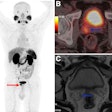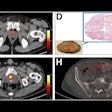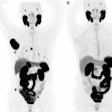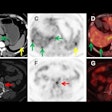Prostate-specific membrane antigen (PSMA)-PET/CT bests conventional imaging when it comes to identifying high-risk, nonmetastatic, hormone-sensitive prostate cancer, researchers have reported.
The findings suggest a better alternative to "conventional" imaging modalities such as CT alone, MRI, or bone scans for tracking prostate cancer in this particular patient population, wrote a team led by Adrien Holzgreve, MD, of the University of California, Los Angeles. The results were published January 3 in JAMA Network Open.
"[Our study] demonstrated that PSMA-PET/CT detected metastatic disease in 46% of all patients, suggesting that a significant number of patients have disease that is understaged by conventional imaging," it noted.
The group assessed PSMA-PET/CT's performance via a study that reviewed results from the phase III EMBARK trial, which evaluated the safety and efficacy of enzalutamide plus leuprolide in patients with nonmetastatic prostate cancer with biochemical recurrence. The investigators noted that this participant eligibility in this trial was based on conventional imaging; their research explored the staging information gathered from gallium-68 (Ga-68) PSMA-11 PET/CT exams in patients with nonmetastatic disease (according to conventional imaging).
The research included data from 182 patients, all of whom had recurrent prostate cancer after radical prostatectomy, definitive radiotherapy, or salvage radiotherapy. Patients included in this work had the following characteristics:
- Prostate-specific antigen (PSA) levels greater than 1 ng/mL after radical prostatectomy and salvage radiotherapy or 2 ng/mL above the lowest value after definitive radiotherapy
- PSA doubling time of nine months or less
- A serum testosterone level of 150 ng/dL or greater
Median prescan PSA levels were 2.4 ng/mL after radical prostatectomy; 6.9 ng/mL after definitive radiotherapy; 2.6 ng/mL after a combination of radical prostatectomy and salvage radiotherapy; and 2.8 ng/mL overall, Holzgreve and colleagues reported.
They also found the following:
| PSMA-PET/CT performance for assessing prostate cancer treatment results | |||
|---|---|---|---|
| Type of treatment | Percentage of positive results | Detection of distant metastatic disease | Detection of polymetastatic disease |
| Radical prostatectomy | 80% | 34% | 19% |
| Definitive radiotherapy | 92% | 56% | 36% |
| Radical prostatectomy and salvage radiotherapy | 85% | 60% | 23% |
| Overall | 84% | 46% | 24% |
The takeaway? PSMA-PET/CT shows promise for helping clinicians predict prostate cancer outcomes and set appropriate treatment protocols, but more research is required, according to the investigators.
"[Our findings suggest] that patients' high-risk nonmetastatic hormone-sensitive prostate cancers are understaged by conventional imaging … challenge the interpretation of previous studies, such as the EMBARK trial, and support the evolving role of PSMA-PET for patient selection in clinical and trial interventions in prostate cancer," they concluded. "Further studies are needed to assess its independent prognostic value and use for treatment guidance."
The full study can be found here.




















